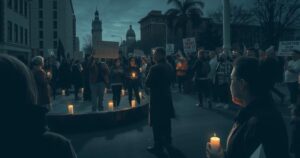Disputed Deportation Flight: Convicted Criminals to South Sudan Sparks Outcry

The Department of Homeland Security is controversially deporting convicted criminals to South Sudan, including murderers and sex offenders. Recent legal shifts have raised questions of due process, with victims’ family members voicing concerns. Notably, U.S. District Judge Brian Murphy ruled that such deportations may violate prior court orders regarding migrant treatment. Legal representatives are now involved, questioning the legality and ethics surrounding these removals.
The recent decision by the Department of Homeland Security (DHS) to transport individuals, convicted of serious crimes, to South Sudan has raised several concerns. The DHS has provided information about eight individuals scheduled for a chartered flight on May 20. They include serious offenders, with allegations ranging from murder to sexual offenses, triggering questions from victim families regarding the haste of such removals.
On May 21, U.S. District Judge Brian Murphy ruled that the flight violated a previous order. This order mandated that the government must offer migrants clear information and sufficient time to raise concerns before transporting them to third countries. Murphy’s ruling emphasized that those individuals should remain in U.S. custody until they complete credible fear interviews. Notably, he did not detail where these individuals could be held during this process.
At a recent press conference, Tricia McLaughlin, DHS Assistant Secretary for Public Affairs, directed reporters to highlight the victims rather than the criminals. She insisted on focusing on the impact of crimes on innocent victims and labeled the offenders as “monsters.” The urgency of this situation has also prompted media outlets, including USA TODAY, to reach out to the victims’ families and legal representatives of those affected.
Among those involved is Thongxay Nilakout, a Laotian citizen convicted in 1994 for murdering a German tourist during a robbery. Released from prison in December 2023 after nearly 28 years, his transfer to ICE custody and the following deportation to South Sudan has been met with resistance from the victim’s family. Birte Pfleger, the victim’s daughter, expressed her discontent with the legal process that she believes failed to protect her family’s rights.
Similarly, Iowa resident Kyaw Mya, a Burmese citizen convicted for lascivious acts against a child, has fallen victim to the complex interplay of legal issues surrounding his case. Mya’s attorney reported difficulty in reaching him after he was transferred to a Texas detention facility. He also raised concerns about the legality of deporting a person to a country they have never been to before.
The list of individuals slated for removal includes various offenders like Enrique Arias-Hierro and Jose Manuel Rodriguez-Quinones, both convicted on serious charges, including homicide and attempted murder. They are joined by others like Jesus Munoz-Gutierrez—convicted of murder—and several individuals from Burma facing charges of sexual assault.
These cases provide only a glimpse into the larger and increasingly controversial practice of deporting serious offenders, raising questions about the process, legality, and the implications for all parties involved.
The ongoing situation concerning the deportation of convicted criminals to South Sudan presents significant legal and ethical challenges. With criticism emerging from victim families and legal representatives regarding due process failures, the validity of such removals is now under scrutiny. As more details come to light, the broader implications for the justice system and the rights of both offenders and victims continue to be a pressing issue.
Original Source: www.usatoday.com






